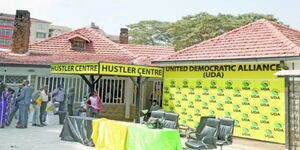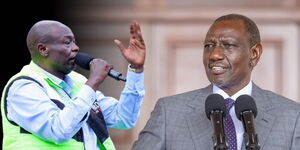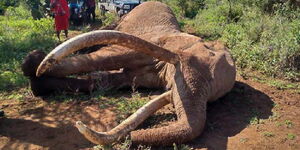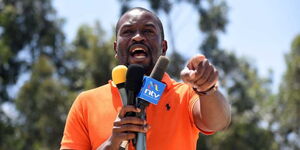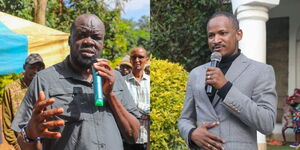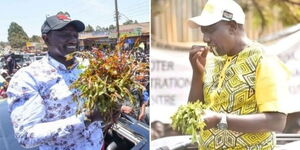Ever since the liberation of the airwaves in the ‘90s and the subsequent strides that have been made in internet penetration as well as the expansion of the national grid, more eyeballs are at the disposal of journalists.
But to get the attention of these audiences in the age of mass self-communication, journalists have to go out of their way to research and uniquely package stories that truly resonate with the public.
To play the conceptual agenda-setting role, journalists are forced to be innovative, analytical and nimble to identify the thematic issues that national audiences can engage with, if they are to have a shot at steering conversations in the streets, coffee shops and boardrooms as well as government offices.
In 2019, Kenyan journalists continued to face a myriad of challenges including; political interference, occupational hazards such as intimidation, death threats and demonisation by the political class, job insecurities occasioned by dwindling media revenues, and the proliferation of fake news.
Nevertheless, these gallant scribes braved it all to bring you in-depth reports, exposés and live coverage of issues that matter most to you and help you make more informed decisions.
Kenyans.co.ke set out to identify some of the scribes who truly shaped conversations nationally in 2019, shocked the government into action and impacted the lives of everyday Kenyans through their innovative brand of journalism.
Dennis Okari
The investigative journalist made damning expose’s in 2019 that had Kenyans putting more attention to the quality of food they partake.
On July 15, 2019, his investigative report, Red Alert, was aired on NTV, shedding light on a populace that is slowly urbanising, and with it an appreciation for refrigeration and the convenience of pick-and-go shopping.
In this feature, the renowned media personality spoke to employees of an unidentified Nairobi supermarket, food experts and relevant authorities in the Ministry of Health, over the use of toxic chemicals to make meat on display look fresher.
One supermarket attendant disclosed that on regular occasions, meat was laced with high levels of Sodium Metabisulphite, which is colloquially referred to as dawa ya nyama, to make it appear fresh for a longer time.
The exposé caused a stir online with the government bowing to the pressure that ensued. Health CS Sicily Kariuki stated that the ministry officials had collected samples from various outlets for analysis and further directed all county public health departments to undertake heightened surveillance in all supermarkets, butcheries, meat processors and other food business operators, to ascertain any presence of additives not permitted for use in meat and meat products.
In yet another exposé that aired on Sunday, November 10, 2019, Okari raised alarm on the high aflatoxin levels in maize meal and milk products. It highlighted how government regulators had allowed millers to flood the market with maize flour containing high levels of cancer-linked aflatoxin.
Just hours before the exposé aired, the Kenya Bureau of Standards (KEBS) suspended the licenses of five millers over the distribution of substandard maize meal. KEBS banned Dola, Starehe, Kifaru, Jembe, Starehe and 210 brands for what was described as failing to “meet the requirements of Kenyan market standards”.
On November 14, the government yet again swung into action with CSs Mwangi Kiunjuri (Agriculture) and Peter Munya (Trade), forming an inter-ministerial committee to probe the aflatoxin in Kenya's staple food after a the public outcry.
Jeff Koinange
Koinange’s show on Citizen TV is arguably one of the most-watched in the country every Wednesday night. In fact, the trending hashtag most Wednesday evenings is #JKLive.
The media personality, who has had a 28-year-stellar career, conducts powerful interviews in a one-of-a-kind flair that spurs conversations.
On July 3, 2019, after the death of Safaricom CEO Bob Collymore, the 53-year-old journalist interviewed Bob’s friends in an emotional show that lifted the veil on the private life of the consummate chief executive.
The ‘boys club’ made up of businessman Ally Khan Satchu, Radio Africa Group CEO Patrick Quarcoo, politician Peter Kenneth, Jeff himself, Scangroup CEO Bharat Thakrar, former British High Commissioner Nic Hailey and Kenya Commercial Bank CEO Joshua Oigara, narrated their interactions with Bob in the months leading to his death.
Their powerful tributes caused a stir online, with the term ‘boys club’ becoming a trending topic on social media as Kenyans reflected on the quality of friends around them and the possibility of them standing by their side in difficult times.
In yet another interview conducted on August 7, 2019, Koinange hosted three young girls with remarkable stories; Ellyanne Wanjiku, founder of Children With Nature, musician Lyla Mohammed and gymnast Wendy Waeni.
It was the latter’s claims against her manager, Joe Mwangi, that he had exploited her and used her skills for personal financial gain, that caused a huge uproar.
Waeni's interview eventually led to the arrest of Joe Mwangi on September 2, 2019, in connection to an alleged forgery of a letter where he purported to be a Cabinet secretary and threatened Waeni’s mother Magdalene Mbele.
Jeff has through the year hosted a number of dramatic interviews including the unceremonious ending of the show after things got out of hand with Nairobi Governor Mike Sonko.
Hussein Mohamed
After a 10-year stint at the country's most-watched broadcaster, Citizen TV, Hussein, who became a household name for his non-nonsense interviewing style of pinning down the who-is-who in Kenyan politics, bowed out in what was considered a big blow to a majority of television audiences.
His final show at the station on Tuesday, October 29 elicited an overwhelming outpour of emotions from his fans, including notable politicians.
Most lauded his integrity and professionalism.
“He has been one of the best interviewers Citizen TV has ever had. He always does a lot of background research before the interview. When he was posing questions he always had an answer for it,” ODM leader Raila Odinga stated.
A month before he quit, in a hard-hitting interview on September 11, 2019, he hosted Kiharu MP Ndindi Nyoro, who had at the time, been in the news cycle since his involvement in chaos at Gitui Catholic Church, over an altercation with Jubilee Nominated MP Maina Kamanda.
“I was to give every member (MP) a chance to talk,” Nyoro began. “Who gives you that right?” Hussein interjected.
“We were in Kiharu Hussein,” Ndindi responded. “So What?” the journalist rejoined implying that the fact that he was the area MP did not give him the right to disrupt a church function. Nyoro was visibly taken aback by Hussein’s response, in an interview that further demonstrated Hussein’s fearless brand of journalism.
Kenyans.co.ke compiled some of Hussein Mohamed’s most controversial interviews on Citizen TV here, from The Big Question, to Newsnight.
John Allan Namu
Ever since the decorated investigative journalist left Standard Group-owned KTN, his investigating reporting portfolio has grown in leaps and bounds, and so has his bravery and the breadth of the topical issues he has gone on to cover under his company, Africa Uncensored.
His efforts continued to pay off in 2019, where he added yet another award to his cabinet for the exposé, The Profiteers, that laid bare the hidden hand of East African neighbours in the protracted conflict in South Sudan.
Namu’s report showed how suspected South Sudanese warlords and their kin were living large in Kenya, Uganda and Ethiopia, undoubtedly blowing proceeds of plunder in the serene atmosphere of their host countries, as South Sudan continued to crumble under interminable senseless war.
On June 26, Namu alongside his crew of cameramen, Elijah Kanyi and Samuel Munia, video editor, Steve Biko and graphics artist, Clement Kumalija, won the 2019 Trace International Award in a gala held in Vancouver, Canada.
The report was scheduled to be aired by his former employer, KTN, in October 2018, but even after running a promo, a disagreement over certain segments the broadcaster wanted removed left Namu with the only option of publishing it on YouTube, where it has to date been viewed more than 500,000 times.
In October 2019, Namu landed a deal with M-Net’s Maisha Magic East to produce a crime drama titled Kina starring celebrated singer-actor Sanaipei Tande.
“We are basically telling human-interest stories that impact society. It is exciting for us because it is a new space, we have done a lot of entertainment but now we want to see how this space grows,” Tim Okwaro, M-Net’s director for East & Southern Africa channels stated during a showcase in Johannesburg, South Africa.
Namu’s production, Bitter Harvest, alongside journalist, Kabugi Mbae, was nominated in the 9th edition of the Kalasha Film and TV Awards on November 1. The documentary sheds light on the plight of Kenyan farmers stuck with their bountiful harvest like a curse in a country that still struggles to feed itself, over five decades since independence. Kabugi spent almost a year touring the country to figure out what ails the country’s food system to compile a disheartening report of the endless toil of aspirational farmers.
In the Kalasha Awards Gala ceremony held on November 30, Africa Uncensored’s My Cancer Story – Uncensored Mtaani won in the Best Documentary category.
Africa Uncensored often partners with The Elephant in hosting panel conversations with thought leaders on critical matters of governance and Kenya’s economy. Notable among them is the November series (filmed in August) Where Did the Money Go?
Carol Radull
Radull is a sports presenter who works for Radio Africa Group.
On October 23, the outspoken radio presenter blasted the government over a predicament that the national netball team was apparently facing in South Africa.
Radull claimed that the team was stranded at a lodging over unpaid bills, a matter that angered many Kenyans. She went on to confess having broken down in tears while talking to one of the girls.
Sports CS, Amina Mohamed, however, denied the allegations asserting that the story was a creation of social media and that it had been blown out of proportion.
Senate Majority Leader Kipchumba Murkomen had given assurance that the Senate’s Sports Committee would move with speed to investigate the matter and recommend action if the reports were confirmed to be true.
On October 25, Amina appeared before the National Assembly committee over the matter, where tempers flared as Webuye West MP Dan Wanyama, himself a retired volleyball player, accused PS Karimi Kaberia Karimi Kaberia of being the head of cartels in the ministry.
Radull is also famous for Jaza Stadi slogan and initiative which she has consistently championed for to encourage interest and pride in local sports.
Lulu Hassan
The celebrated Citizen TV Swahili news anchor is a journalist of many talents. When she is not co-hosting the Nipashe Wikendi bulletin with her husband Rashid Abdallah, she is either chasing a human-interest feature or leading the production of award-winning Swahili soap operas under her company, Jiffy Pictures.
Lulu’s feature series Prison Diaries in March brought tears to the eyes of countless households. On March 17, the heartbreaking story of Julius Wambua, a man who had already spent 10 years at Kamiti Maximum Security Prison after the chilling accusations of his own daughter, led to his incarceration was aired.
Lulu would track down the now grown-up daughter and bring them together for the first time in a decade, where she confessed to being coached and threatened into making the damning accusations. A three-judge bench at the Court of Appeal in May declined an application by Wambua to introduce his daughter’s evidence in his appeal.
The airing of another episode involving Mboya Ndindi, a man found guilty of killing his father, ostensibly led to his release after spending 18 years at the prison.
Lulu, with the help of the convict, facilitated the reconciliation of Mboya and his siblings who had not set eyes on each other since he was whisked away by police officers after a fit of rage caused him to kill his father with a panga blow intended for his brother.
“I am glad that you came, all I ever wanted was to see you and to ask for your forgiveness, to know how you were doing and to also let you know of my welfare. God is great,” Ndindi told his siblings in the emotional reunion.
Mboya would later appeal to have his sentence reduced or scrapped altogether.
His reconciliation appears to have paid off as the court heard his plea.
"I was presented in court and the judge said that the time I had served was enough and I was released. I almost fainted in disbelief," he stated. Mboya, who had served 18 years of his life sentence, maintained that he hadn't given up hope that he would one day be set free.

